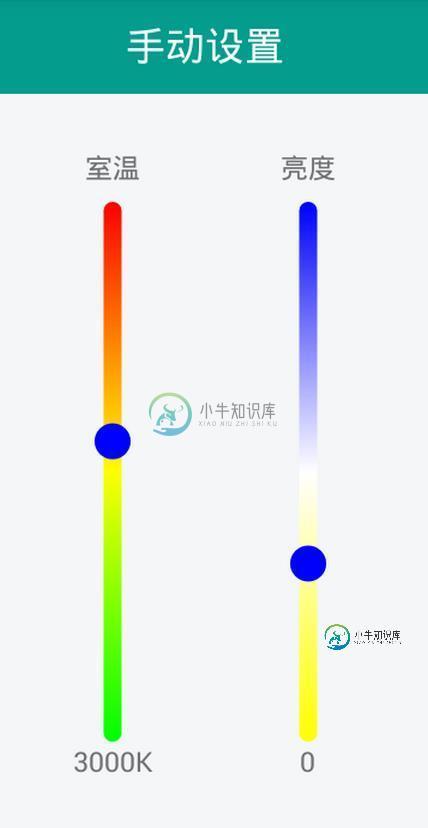Android自定义竖直方向SeekBar多色进度条
写在前面
因为有这样的一个场景,需要实现竖直方向的多色进度条,然后在网上也找了下,没看到符合需要的,于是自定义了一个,效果如下:

具体实现
本来想定义水平的,然后旋转一下,后来发现还不如直接定义竖直方向来的直接,就直接在竖直方向画了下。
首先讲一下思路,就是通过继承View,然后通过onDraw()方法进行绘制。具体绘制的时候,需要处理一些小细节。
比如,我们需要画一个圆形的滑动块,那么我们的背景色带就不能把整个宽度占满,要不然,小圆块只能和色带一样宽了,效果不是很好看,所以在绘制的时候应该把背景画的宽度小于View的实际宽度。
接下来我要贴代码了:
@Override
protected void onDraw(Canvas canvas) {
super.onDraw(canvas);
int h = getMeasuredHeight();
int w = getMeasuredWidth();
mRadius = (float) w/2;
sLeft = w * 0.25f; // 背景左边缘坐标
sRight = w * 0.75f;// 背景右边缘坐标
sTop = 0;
sBottom = h;
sWidth = sRight - sLeft; // 背景宽度
sHeight = sBottom - sTop; // 背景高度
x = (float) w/2;//圆心的x坐标
y = (float) (1-0.01*progress)*sHeight;//圆心y坐标
drawBackground(canvas);
drawCircle(canvas);
paint.reset();
}
再看下画背景:
private void drawBackground(Canvas canvas){
RectF rectBlackBg = new RectF(sLeft, sTop, sRight, sBottom);
linearGradient=new LinearGradient(sLeft,sTop,sWidth,sHeight,colorArray,null, Shader.TileMode.MIRROR);
paint.setAntiAlias(true);
paint.setStyle(Paint.Style.FILL);
//设置渲染器
paint.setShader(linearGradient);
canvas.drawRoundRect(rectBlackBg, sWidth/2, sWidth/2, paint);
}
这里使用LinearGradient实现多种颜色渐变,默认初始化定义如下:
private int endColor=Color.WHITE;
private int thumbColor=Color.BLACK;
private int thumbBorderColor=Color.WHITE;
private int colorArray[]={startColor, middleColor, endColor};
然后看下画圆的操作:
private void drawCircle(Canvas canvas){
Paint thumbPaint = new Paint();
y = y < mRadius ? mRadius : y;//判断thumb边界
y = y > sHeight-mRadius ? sHeight-mRadius : y;
thumbPaint.setAntiAlias(true);
thumbPaint.setStyle(Paint.Style.FILL);
thumbPaint.setColor(thumbColor);
canvas.drawCircle(x, y, mRadius, thumbPaint);
thumbPaint.setStyle(Paint.Style.STROKE);
thumbPaint.setColor(thumbBorderColor);
thumbPaint.setStrokeWidth(2);
canvas.drawCircle(x, y, mRadius, thumbPaint);
}
这里通过画布画了一个圆形,内部填充和外边沿。
上面的过程已经可以使效果展示出来了,但是无法操作,我们还需要给它加上事件才行:
@Override
public boolean onTouchEvent(MotionEvent event) {
this.y = event.getY();
progress= (sHeight-y)/sHeight*100;
switch(event.getAction()) {
case MotionEvent.ACTION_DOWN:
break;
case MotionEvent.ACTION_UP:
if (onStateChangeListener!=null){
onStateChangeListener.onStopTrackingTouch(this, progress);
}
break;
case MotionEvent.ACTION_MOVE:
if (onStateChangeListener!=null){
onStateChangeListener.OnStateChangeListener(this, progress);
}
setProgress(progress);
this.invalidate();
break;
}
return true;
}
public interface OnStateChangeListener{
void OnStateChangeListener(View view, float progress);
void onStopTrackingTouch(View view, float progress);
}
public void setOnStateChangeListener(OnStateChangeListener onStateChangeListener){
this.onStateChangeListener=onStateChangeListener;
}
这里写了个回调接口,然后我们在Activity中就可以接收到相应的滑动进度,进而进行操作,当然,这里我们还得再加一个方法,以便改变seekbar的状态:
public void setProgress(float progress) {
this.progress = progress;
invalidate();
}
到这里,功能基本就OK了,然后我们可以在Activity中去使用它了,下面是布局中的引用:
<?xml version="1.0" encoding="utf-8"?>
<LinearLayout xmlns:android="http://schemas.android.com/apk/res/android"
android:orientation="vertical"
android:layout_width="match_parent"
android:layout_height="match_parent"
android:background="@color/bgColor"
>
<include layout="@layout/bar_simple_title" />
<LinearLayout
android:layout_width="match_parent"
android:layout_height="match_parent"
android:orientation="horizontal"
android:gravity="center"
>
<RelativeLayout
android:layout_marginTop="20dp"
android:layout_width="wrap_content"
android:layout_height="match_parent"
android:layout_marginRight="35dp"
>
<TextView
android:id="@+id/tv_inner_temper"
android:layout_width="wrap_content"
android:layout_height="wrap_content"
android:text="@string/inner_temperature"
android:layout_centerHorizontal="true"
/>
<com.tfxiaozi.widget.VerticalColorSeekBar
android:id="@+id/vpb_inner_temper"
android:layout_width="20dp"
android:layout_height="300dp"
android:layout_centerHorizontal="true"
android:layout_marginTop="30dp"/>
<TextView
android:id="@+id/tv_current_temper"
android:layout_below="@id/vpb_inner_temper"
android:layout_width="wrap_content"
android:layout_height="wrap_content"
android:text="@string/current_temperature"
/>
</RelativeLayout>
<RelativeLayout
android:layout_marginLeft="35dp"
android:layout_marginTop="20dp"
android:layout_width="wrap_content"
android:layout_height="match_parent"
>
<TextView
android:id="@+id/tv_brightness"
android:layout_width="wrap_content"
android:layout_height="wrap_content"
android:text="@string/brightness"
android:layout_centerHorizontal="true"
/>
<com.tfxiaozi.widget.VerticalColorSeekBar
android:id="@+id/vpb_brightness"
android:layout_width="20dp"
android:layout_height="300dp"
android:layout_centerHorizontal="true"
android:layout_marginTop="30dp"/>
<TextView
android:id="@+id/tv_current_brightness"
android:layout_below="@id/vpb_brightness"
android:layout_width="wrap_content"
android:layout_height="wrap_content"
android:layout_centerHorizontal="true"
android:text="0"
/>
</RelativeLayout>
</LinearLayout>
</LinearLayout>
怎么使用就很简单了:
package com.tfxiaozi.activity.setting;
import android.graphics.Color;
import android.os.Bundle;
import android.view.View;
import android.widget.ImageView;
import android.widget.TextView;
import com.tfxiaozi.R;
import com.tfxiaozi.activity.BaseActivity;
import com.tfxiaozi.utils.ToastUtils;
import com.tfxiaozi.widget.VerticalColorSeekBar;
/**
* Created by dongqiang on 2016/10/16.
*/
public class ManualSettingActivity extends BaseActivity implements View.OnClickListener, VerticalColorSeekBar.OnStateChangeListener {
private TextView tvCurrentTemper, tvCurrentBrightness, tvMainTitle;
private ImageView ivBack;
private VerticalColorSeekBar vpbInnerTemper;
private VerticalColorSeekBar vpbBrightness;
@Override
protected void onCreate(Bundle savedInstanceState) {
super.onCreate(savedInstanceState);
setContentView(R.layout.activity_manual_setting);
initViews();
initEvents();
initData();
}
private void initViews() {
tvMainTitle = (TextView) findViewById(R.id.title_main_text);
tvMainTitle.setText(getString(R.string.manual_setting));
tvMainTitle.setVisibility(View.VISIBLE);
ivBack = (ImageView) findViewById(R.id.title_back);
ivBack.setVisibility(View.VISIBLE);
tvCurrentTemper = (TextView) findViewById(R.id.tv_current_temper);
tvCurrentBrightness = (TextView) findViewById(R.id.tv_current_brightness);
vpbInnerTemper = (VerticalColorSeekBar)findViewById(R.id.vpb_inner_temper);
vpbBrightness = (VerticalColorSeekBar) findViewById(R.id.vpb_brightness);
vpbInnerTemper.setColor(Color.RED, Color.YELLOW, Color.GREEN, Color.BLUE, Color.TRANSPARENT);
vpbBrightness.setColor(Color.BLUE, Color.WHITE, Color.YELLOW, Color.BLUE, Color.TRANSPARENT);
}
private void initEvents() {
ivBack.setOnClickListener(this);
vpbInnerTemper.setOnStateChangeListener(this);
vpbBrightness.setOnStateChangeListener(this);
}
private void initData() {
vpbInnerTemper.setProgress(50);
vpbBrightness.setProgress(70);
}
@Override
public void onClick(View v) {
switch (v.getId()) {
case R.id.title_back:
finish();
break;
}
}
@Override
public void OnStateChangeListener(View view, float progress) {
}
@Override
public void onStopTrackingTouch(View view, float progress) {
int viewId = view.getId();
switch (viewId) {
case R.id.vpb_inner_temper:
if (progress < 0) {
progress = 0;
}
if(progress > 100) {
progress = 100;
}
ToastUtils.showShort(this, "progress= " + progress);
break;
case R.id.vpb_brightness:
if (progress < 0) {
progress = 0;
}
if(progress > 100) {
progress = 100;
}
ToastUtils.showShort(this, "progress1= " + progress);
break;
}
}
}
到这里就结束了,最后还是附上自定义View的整个代码吧:
package com.tfxiaozi.widget;
import android.content.Context;
import android.graphics.Canvas;
import android.graphics.Color;
import android.graphics.LinearGradient;
import android.graphics.Paint;
import android.graphics.RectF;
import android.graphics.Shader;
import android.util.AttributeSet;
import android.util.Log;
import android.view.MotionEvent;
import android.view.View;
/**
* Created by dongqiang on 2016/10/21.
*/
public class VerticalColorSeekBar extends View{
private static final String TAG = VerticalColorSeekBar.class.getSimpleName();
private int startColor= Color.BLACK;
private int middleColor = Color.GRAY;
private int endColor=Color.WHITE;
private int thumbColor=Color.BLACK;
private int thumbBorderColor=Color.WHITE;
private int colorArray[]={startColor, middleColor, endColor};
private float x,y;
private float mRadius;
private float progress;
private float maxCount = 100f;
private float sLeft, sTop, sRight, sBottom;
private float sWidth,sHeight;
private LinearGradient linearGradient;
private Paint paint = new Paint();
protected OnStateChangeListener onStateChangeListener;
public VerticalColorSeekBar(Context context) {
this(context, null);
}
public VerticalColorSeekBar(Context context, AttributeSet attrs) {
super(context, attrs);
}
@Override
protected synchronized void onMeasure(int widthMeasureSpec, int heightMeasureSpec) {
super.onMeasure(widthMeasureSpec, heightMeasureSpec);
setMeasuredDimension(getMeasuredWidth(), getMeasuredHeight());
}
public void setColor(int startColor,int middleColor, int endColor,int thumbColor,int thumbBorderColor){
this.startColor= startColor;
this.middleColor = middleColor;
this.endColor= endColor;
this.thumbColor= thumbColor;
this.thumbBorderColor= thumbBorderColor;
colorArray[0] = startColor;
colorArray[1] = middleColor;
colorArray[2] = endColor;
}
@Override
protected void onDraw(Canvas canvas) {
super.onDraw(canvas);
int h = getMeasuredHeight();
int w = getMeasuredWidth();
mRadius = (float) w/2;
sLeft = w * 0.25f; // 背景左边缘坐标
sRight = w * 0.75f;// 背景右边缘坐标
sTop = 0;
sBottom = h;
sWidth = sRight - sLeft; // 背景宽度
sHeight = sBottom - sTop; // 背景高度
x = (float) w/2;//圆心的x坐标
y = (float) (1-0.01*progress)*sHeight;//圆心y坐标
drawBackground(canvas);
drawCircle(canvas);
paint.reset();
}
private void drawBackground(Canvas canvas){
RectF rectBlackBg = new RectF(sLeft, sTop, sRight, sBottom);
linearGradient=new LinearGradient(sLeft,sTop,sWidth,sHeight,colorArray,null, Shader.TileMode.MIRROR);
paint.setAntiAlias(true);
paint.setStyle(Paint.Style.FILL);
//设置渲染器
paint.setShader(linearGradient);
canvas.drawRoundRect(rectBlackBg, sWidth/2, sWidth/2, paint);
}
private void drawCircle(Canvas canvas){
Paint thumbPaint = new Paint();
y = y < mRadius ? mRadius : y;//判断thumb边界
y = y > sHeight-mRadius ? sHeight-mRadius : y;
thumbPaint.setAntiAlias(true);
thumbPaint.setStyle(Paint.Style.FILL);
thumbPaint.setColor(thumbColor);
canvas.drawCircle(x, y, mRadius, thumbPaint);
thumbPaint.setStyle(Paint.Style.STROKE);
thumbPaint.setColor(thumbBorderColor);
thumbPaint.setStrokeWidth(2);
canvas.drawCircle(x, y, mRadius, thumbPaint);
}
@Override
public boolean onTouchEvent(MotionEvent event) {
this.y = event.getY();
progress= (sHeight-y)/sHeight*100;
switch(event.getAction()) {
case MotionEvent.ACTION_DOWN:
break;
case MotionEvent.ACTION_UP:
if (onStateChangeListener!=null){
onStateChangeListener.onStopTrackingTouch(this, progress);
}
break;
case MotionEvent.ACTION_MOVE:
if (onStateChangeListener!=null){
onStateChangeListener.OnStateChangeListener(this, progress);
}
setProgress(progress);
this.invalidate();
break;
}
return true;
}
public interface OnStateChangeListener{
void OnStateChangeListener(View view, float progress);
void onStopTrackingTouch(View view, float progress);
}
public void setOnStateChangeListener(OnStateChangeListener onStateChangeListener){
this.onStateChangeListener=onStateChangeListener;
}
public void setProgress(float progress) {
this.progress = progress;
invalidate();
}
}
结束
到这里就真的结束啦,就当记录一下吧,然后也希望帮到有需要的人。有更好的实现也可以告诉我哈~
以上就是本文的全部内容,希望对大家的学习有所帮助,也希望大家多多支持小牛知识库。
-
本文向大家介绍Android自定义垂直拖动seekbar进度条,包括了Android自定义垂直拖动seekbar进度条的使用技巧和注意事项,需要的朋友参考一下 Android自带的SeekBar是水平的,要垂直的,必须自己写一个类,继承SeekBar。 一个简单的垂直SeekBar的例子: (但是它其实是存在一些问题的。不过要是满足基本需要还是可以凑合的) Demo中加上一个水平SeekBar作为
-
本文向大家介绍Android 可拖动的seekbar自定义进度值,包括了Android 可拖动的seekbar自定义进度值的使用技巧和注意事项,需要的朋友参考一下 最近接了个项目其中有需要要实现此功能:seekbar需要显示最左和最右值,进度要跟随进度块移动。下面通过此图给大家展示下效果,可能比文字描述要更清晰。 其实实现起来很简单,主要是思路。自定义控件的话也不难,之前我的博客也有专门介绍,这里
-
本文向大家介绍Android自定义SeekBar实现视频播放进度条,包括了Android自定义SeekBar实现视频播放进度条的使用技巧和注意事项,需要的朋友参考一下 本文实例为大家分享了Android实现视频播放进度条的具体代码,供大家参考,具体内容如下 首先来看一下效果图,如下所示: 其中进度条如下: 接下来说一说我的思路,上面的进度拖动条有自定义的Thumb,在Thumb正上方有一个Popu
-
本文向大家介绍Android编程自定义进度条颜色的方法详解,包括了Android编程自定义进度条颜色的方法详解的使用技巧和注意事项,需要的朋友参考一下 本文实例讲述了Android编程自定义进度条颜色的方法。分享给大家供大家参考,具体如下: 先看效果图: 老是提些各种需求问题,我觉得系统默认的颜色挺好的,但是Pk不过,谁叫我们不是需求人员呢,改吧! 这个没法了只能看源码了,还好下载了源码, sou
-
本文向大家介绍Android编程实现自定义进度条颜色的方法,包括了Android编程实现自定义进度条颜色的方法的使用技巧和注意事项,需要的朋友参考一下 本文实例讲述了Android编程实现自定义进度条颜色的方法。分享给大家供大家参考,具体如下: android 自定义进度条颜色 先看图 基于产品经理各种自定义需求,经过查阅了解,下面是自己对android自定义进度条的学习过程! 这个没法了只能看源
-
有人能帮我创建balow图像剪切搜索栏吗?我已经用自定义拇指和分段文本浏览过SeekBar,还有SeekBar拇指位置问题 但是我没有成功创建我的客户搜索栏,请帮助我

